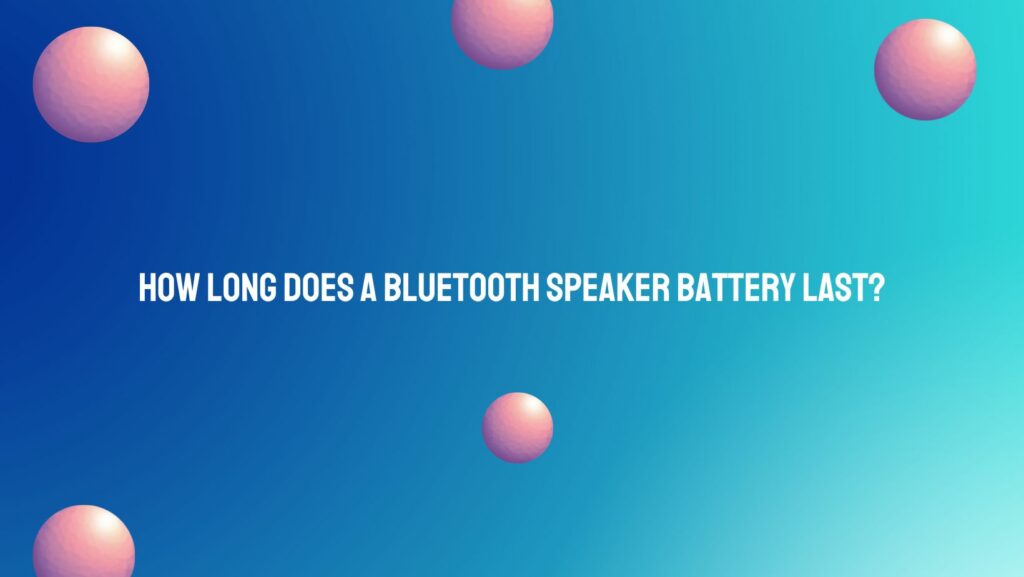Bluetooth speakers have revolutionized the way we listen to music and enjoy audio on the go. These portable devices have become a staple for music lovers, outdoor enthusiasts, and anyone looking for a convenient way to enjoy their favorite tunes without the hassle of cords and wires. One of the most critical aspects of a Bluetooth speaker is its battery life. In this comprehensive article, we will delve into the factors that affect the longevity of a Bluetooth speaker’s battery and offer tips on how to maximize it.
- Battery Types
The longevity of a Bluetooth speaker’s battery life is heavily influenced by the type of battery it uses. The most common battery types found in Bluetooth speakers are:
a. Lithium-Ion (Li-ion): Li-ion batteries are widely used in modern Bluetooth speakers due to their high energy density, light weight, and reliability. These batteries have a reasonably long lifespan, typically offering 300 to 500 full charge-discharge cycles before significant degradation occurs.
b. Lithium-Polymer (LiPo): LiPo batteries are similar to Li-ion batteries but are often found in sleek, slim, and compact Bluetooth speakers. They provide a good balance between size and capacity.
c. Nickel-Metal Hydride (NiMH) and Nickel-Cadmium (NiCd): These older battery technologies are rarely used in modern Bluetooth speakers due to their lower energy density and sensitivity to overcharging. They also have memory effects, meaning they need to be fully discharged before recharging to maintain capacity.
- Speaker Design
The design of the Bluetooth speaker plays a crucial role in determining its battery life. Factors that influence battery life based on design include:
a. Speaker Size: Larger Bluetooth speakers can accommodate more extensive battery capacity, resulting in longer playback times. Smaller, more portable speakers have limited space for batteries and, therefore, tend to have shorter battery life.
b. Power Efficiency: Energy-efficient components, including the speaker drivers, amplifier, and Bluetooth module, can significantly extend the battery life of a speaker.
- Usage Patterns
Your usage patterns and how you handle your Bluetooth speaker can significantly impact its battery life:
a. Volume Levels: Playing music at high volumes drains the battery more quickly than at lower volumes. Reducing the volume can extend the speaker’s battery life.
b. Bluetooth Range: Keeping your connected device (phone, tablet, etc.) close to the speaker can help conserve power. The farther the device, the more energy the Bluetooth connection consumes.
c. Idle Time: If you leave your speaker on without playing any music, it will still consume some power. Turning it off when not in use can help preserve the battery.
- Charging Habits
Proper charging habits are essential to maintaining a Bluetooth speaker’s battery life:
a. Avoid Overcharging: Many modern Bluetooth speakers come with overcharging protection, but it’s still advisable to unplug the device once it’s fully charged.
b. Full Discharge: While Li-ion and LiPo batteries don’t suffer from memory effects, it’s good practice to let them fully discharge occasionally and then recharge to help calibrate the battery gauge.
Conclusion
The battery life of a Bluetooth speaker varies widely based on the battery type, design, usage patterns, and charging habits. As technology advances, newer Bluetooth speakers tend to offer longer battery life, with some high-end models capable of providing 10 hours or more of continuous playback on a single charge. Understanding the factors that influence battery life and adopting best practices can help you maximize the longevity of your Bluetooth speaker’s battery. Whether you use it for picnics, parties, or as a portable audio solution, a Bluetooth speaker with good battery life enhances your listening experience and ensures that you can enjoy music without frequent interruptions.

